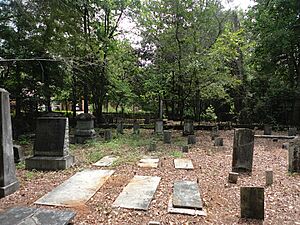Caesar Blackwell facts for kids
Caesar Blackwell (born 1769, died 1845) was an African-American preacher who lived in Alabama. Even though he was enslaved, he became a well-known preacher in the South. He often preached to groups of both black and white people. The Alabama Baptist Association, a group of Baptist churches, either bought his freedom or helped him become free. He preached at the Antioch Baptist Church in Montgomery County, Alabama.
Biography
Caesar Blackwell was enslaved by a man named John Blackwell. In 1821, he joined the Antioch Baptist Church. This church had been started three years earlier by James McLemore, another preacher. Caesar Blackwell preached to many people, both black and white. People say his sermons drew "standing-room-only crowds."
How He Became Free
There are different stories about how Caesar Blackwell became free. Some say the Alabama Baptist Association (ABA) bought and freed him in 1825. This was after his owner passed away. The ABA was a group of Baptist churches formed in 1819.
Other accounts suggest that the Antioch church tried to buy his freedom in 1828 but did not succeed. Later, the ABA bought him. He then became a preaching helper for James McLemore. McLemore already enslaved Blackwell's wife and child.
Another story says Blackwell was enslaved by McLemore. After McLemore died, the Baptist association arranged to buy him. Some reports say he was bought for $1,000, while others say $625 and then set free. No matter the exact details, Caesar Blackwell was highly respected by both white and black people. He often visited white homes.
What He Preached About
Most sources agree that Blackwell was chosen to preach and baptize new believers in the enslaved community. His price was often noted as $625. He preached to both black and white people.
Blackwell was known for understanding Christian teachings very well. White people at the time praised him for trying to improve black Christianity. They wanted to remove what they saw as "black superstition."
Even though he was enslaved, Blackwell was allowed to keep the money he earned from preaching. This lasted until the 1830s. Around 1832, attitudes among white people changed. This was because of slave rebellions in different Southern states. These events led to strict rules about education and rights for enslaved people.
After 1835, Blackwell could only keep money for his expenses. His preaching activities were also limited. Events like Nat Turner's slave rebellion (1831) and the United States v. The Amistad case (1841) caused these limits.
His friend and mentor, James McLemore, died in 1835. By 1844, Blackwell was not in good health. However, he continued to baptize many new believers. He would lead them "singing...through the streets of Montgomery" to be baptized.
Caesar Blackwell passed away in 1845. He was buried near James McLemore. A special stone was placed to honor him. The Alabama Baptist Association paid for his funeral costs.
Blackwell is buried at the McLemore Taylor cemetery in Montgomery. This cemetery is in the Greystone neighborhood. His grave is just outside the main enclosed area of the cemetery.
 | Kyle Baker |
 | Joseph Yoakum |
 | Laura Wheeler Waring |
 | Henry Ossawa Tanner |


